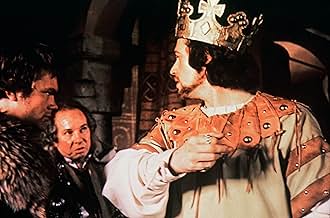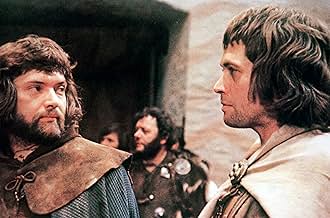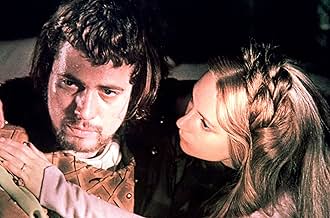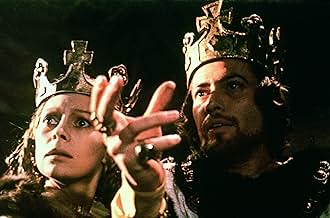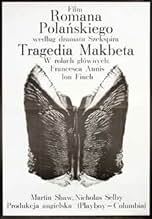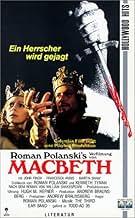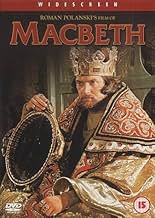A ruthlessly ambitious Scottish lord seizes the throne with the help of his scheming wife and a trio of witches.A ruthlessly ambitious Scottish lord seizes the throne with the help of his scheming wife and a trio of witches.A ruthlessly ambitious Scottish lord seizes the throne with the help of his scheming wife and a trio of witches.
- Director
- Writers
- Stars
- Won 1 BAFTA Award
- 3 wins & 2 nominations total
- Director
- Writers
- All cast & crew
- Production, box office & more at IMDbPro
Featured reviews
Roman Polanski's blood-soaked version of Shakespeare's Scottish play was the video version of choice when we were studying this at school, in spite of it having a nude Lady Macbeth and witches (and Keith Chegwin in the cast - he's Banquo's son).
Jon Finch has the lead and he is exceptionally good. Even a dagger which really appears to float before him (an effect not needed) doesn't spoil things. Odd that he never really got good movie roles after this. His Lady M is Francesca Annis, a spider of a schemer, also putting in a good performance.
Less adequate are Martin Shaw as Banquo, Stephan Chase as Malcolm, and Sydney Bromley as the Porter, although Terence Bayler gives good value as Macduff.
Perhaps this Macbeth is the first one to be truly cinematic, something that even Orson Welles couldn't achieve with Scots accents and Scandinavian settings. It remains memorable long after seeing and, in its excesses, opens up the text for a new generation, and finally, sees the repellent murdering usurper get what he deserves.
(Incidentally for perspective, the book 'Macbeth - man and myth' by Nick Aitchison looks at the real historic facts in accessible coffee-table book style).
Jon Finch has the lead and he is exceptionally good. Even a dagger which really appears to float before him (an effect not needed) doesn't spoil things. Odd that he never really got good movie roles after this. His Lady M is Francesca Annis, a spider of a schemer, also putting in a good performance.
Less adequate are Martin Shaw as Banquo, Stephan Chase as Malcolm, and Sydney Bromley as the Porter, although Terence Bayler gives good value as Macduff.
Perhaps this Macbeth is the first one to be truly cinematic, something that even Orson Welles couldn't achieve with Scots accents and Scandinavian settings. It remains memorable long after seeing and, in its excesses, opens up the text for a new generation, and finally, sees the repellent murdering usurper get what he deserves.
(Incidentally for perspective, the book 'Macbeth - man and myth' by Nick Aitchison looks at the real historic facts in accessible coffee-table book style).
"The Tragedy of Macbeth" (simply abbreviated "Macbeth" on most video covers) is a violent retelling of Shakespeare's classic story. Macbeth (Jon Finch), the Scottish Thane of Glamis, conspires with his wife Lady Macbeth (and three strange witches) to kill the widely-respected King Duncan. After committing the awful deed, Macbeth begins hallucinating, hearing strange omens of death and haunting words; his wife similarly becomes worried with Macbeth's bloodlust, and Duncan's son convinces himself that Macbeth was involved in some way with the killing.
"Macbeth" is a true tragedy, and chances are you already know a great deal about it as it seems to be a high school requirement that it be read by all students. The remarkable thing about Roman Polanski's movie is that it is not only a painfully accurate retelling of William Shakespeare's story, but doesn't flinch when it comes to violence.
According to IMDb's trivia section (and I can't honestly say how reliable this information is, mind you), Polanski included very violent scenes (such as Duncan's death, which is NOT detailed in the original text) because the movie was filmed around the same time period of Sharon Tate's brutal murder, and it was Polanski's way of venting stress and anger. One must imagine what happens to Duncan in this film is what Polanski wanted to do to the Manson family members (and you certainly can't blame him).
As such, knowing the circumstances of what brought about the violence, it is more forgivable and certainly maintains a haunting element - some kind of historical relic, just in knowing that it was filmed during such a terrible time in Polanski's life.
The movie as a whole is wonderful. As I mentioned above, its accuracy (in comparison to Shakespeare's text) is spot-on -- entire scenes of dialogue are taken directly from the source, and even the strong violence lends the film a more realistic nature.
Overall, it's an epic and (sadly) somewhat forgotten Shakespeare epic. If you enjoyed "Hamlet" or "Romeo and Juliet" (the '60s version) you'll certainly find this engaging, and - at times - rather shocking, too.
"Macbeth" is a true tragedy, and chances are you already know a great deal about it as it seems to be a high school requirement that it be read by all students. The remarkable thing about Roman Polanski's movie is that it is not only a painfully accurate retelling of William Shakespeare's story, but doesn't flinch when it comes to violence.
According to IMDb's trivia section (and I can't honestly say how reliable this information is, mind you), Polanski included very violent scenes (such as Duncan's death, which is NOT detailed in the original text) because the movie was filmed around the same time period of Sharon Tate's brutal murder, and it was Polanski's way of venting stress and anger. One must imagine what happens to Duncan in this film is what Polanski wanted to do to the Manson family members (and you certainly can't blame him).
As such, knowing the circumstances of what brought about the violence, it is more forgivable and certainly maintains a haunting element - some kind of historical relic, just in knowing that it was filmed during such a terrible time in Polanski's life.
The movie as a whole is wonderful. As I mentioned above, its accuracy (in comparison to Shakespeare's text) is spot-on -- entire scenes of dialogue are taken directly from the source, and even the strong violence lends the film a more realistic nature.
Overall, it's an epic and (sadly) somewhat forgotten Shakespeare epic. If you enjoyed "Hamlet" or "Romeo and Juliet" (the '60s version) you'll certainly find this engaging, and - at times - rather shocking, too.
Dark, bloody and brooding version of Shakespeare's play about a doomed Scottish king who was, according to his wife, Lady MacBeth "too full of the milk of human kindness to catch the nearest way". This is one of Shakespeare's later plays and is entirely devoid of some of the lighter moments prevalent in his earlier work.
Macbeth, a loyal Scottish thane and a cousin of King Duncan, is waylaid with his companion, Banquo, by three witches who prophesise that he will become king and that Banquo will beget kings. Once MacBeth has informed his wife of these predictions, he is propelled by her and by his own lust for power on a journey of self-destruction leading ultimately to madness. In his determination to bring about the witches' predictions, he kills his liege-lord, steals the crown from the rightful heirs, who flee into exile on suspicion of regicide and patricide, then orders the secret murder of ally and friend Banquo and Banquo's son Fleance. So begins a descent into a nightmare existence, replete with ghostly apparitions, sleepless angst and withering self-doubt. Gradually mutual distrust emerges between himself and the nobles whose support maintains his position, and eventually he murders the wife and children of one MacDuff, an act which symbolises the horror he has become. MacDuff, along with other Scottish nobles, has joined the exiled heir, Malcolm, who lives under the protection of the English king. An army of rebellion - or liberation - is brought to bear on MacBeth's stronghold, whilst inside, MacBeth has begun "to grow aweary of the sun". The witches have told him that he cannot be killed by any "man of woman born". But, in the final fight scene, he learns too late that MacDuff "was, from his mother's womb, untimely ripped" and that the witches have, in Banquo's words from the start of the play, won him "with honest trifles" and betrayed him "in deepest consequence", and his destruction is complete.
This is a suitably melancholic reading, full of images of blood, of sombre leaden skies, of torrential downpours and of thickset, bearded nobles. Scotland is presented as a gloomy outcrop on the edge of the known world and the sun has been heavily filtered by Polanski, giving the film a surreal and eerie feel and stressing the superstitious environment in which the play is set. We are also treated to a fair representation of the early Middle Ages, a time when travelling lords and ladies and their kith and kin slept communally on straw in the great halls, side by side with their massive hunting dogs.
The obviously archaic dialogue has been abridged and everso slightly updated for modern audiences. The lines are delivered eloquently by the two leads, Jon Finch and Francesca Annis, who are well matched as the doomed couple, and this clipped entry would be a good introduction to Shakespeare for those of the MTV-set with a literary inclination. All in all a good stab at bringing Shakespeare into the twentieth century and an effort which the bard himself might well have smiled upon.
Macbeth, a loyal Scottish thane and a cousin of King Duncan, is waylaid with his companion, Banquo, by three witches who prophesise that he will become king and that Banquo will beget kings. Once MacBeth has informed his wife of these predictions, he is propelled by her and by his own lust for power on a journey of self-destruction leading ultimately to madness. In his determination to bring about the witches' predictions, he kills his liege-lord, steals the crown from the rightful heirs, who flee into exile on suspicion of regicide and patricide, then orders the secret murder of ally and friend Banquo and Banquo's son Fleance. So begins a descent into a nightmare existence, replete with ghostly apparitions, sleepless angst and withering self-doubt. Gradually mutual distrust emerges between himself and the nobles whose support maintains his position, and eventually he murders the wife and children of one MacDuff, an act which symbolises the horror he has become. MacDuff, along with other Scottish nobles, has joined the exiled heir, Malcolm, who lives under the protection of the English king. An army of rebellion - or liberation - is brought to bear on MacBeth's stronghold, whilst inside, MacBeth has begun "to grow aweary of the sun". The witches have told him that he cannot be killed by any "man of woman born". But, in the final fight scene, he learns too late that MacDuff "was, from his mother's womb, untimely ripped" and that the witches have, in Banquo's words from the start of the play, won him "with honest trifles" and betrayed him "in deepest consequence", and his destruction is complete.
This is a suitably melancholic reading, full of images of blood, of sombre leaden skies, of torrential downpours and of thickset, bearded nobles. Scotland is presented as a gloomy outcrop on the edge of the known world and the sun has been heavily filtered by Polanski, giving the film a surreal and eerie feel and stressing the superstitious environment in which the play is set. We are also treated to a fair representation of the early Middle Ages, a time when travelling lords and ladies and their kith and kin slept communally on straw in the great halls, side by side with their massive hunting dogs.
The obviously archaic dialogue has been abridged and everso slightly updated for modern audiences. The lines are delivered eloquently by the two leads, Jon Finch and Francesca Annis, who are well matched as the doomed couple, and this clipped entry would be a good introduction to Shakespeare for those of the MTV-set with a literary inclination. All in all a good stab at bringing Shakespeare into the twentieth century and an effort which the bard himself might well have smiled upon.
How does one do justice to one of the most nihilistic murderers in the history of drama? Even Richard the Third has a sense of humor. but once MacBeth buys into the witch's prophecy (which he doesn't have to do) - it's all straight to hell from there. Even his wife finally gets the idea that 'When you choose to ride the tiger, you don't get off' as one Confucian wit put it, long ago....
This is the film that put an end to the "high-school" Shakespeare that we all had to suffer through in the 1960s. That Shakespeare was dull, lifeless, meaninglessly conservative - everyone hated him. In America, we had heard about Peter Brooks, and about an all-nude MacBeth (which of course never happened, the reference was to the "out damn spot' scene, just as we see in this movie); and there were the legendary Orson Welles versions that were, unfortunately, wholly unavailable at the time. Then Zeffirelli made his Romeo and Juliet, showing Romeo's bare butt, even in the ad for the film, and we started getting the glimmer that Shakespeare had been a real person writing about other real people - then came Polanski's MacBeth.
I won't lie and tell you that this is the definitive MacBeth - or even that it's a really great movie - all of the actors seem like they are way over their heads in this material.
But Polanski's purely cinematic bravado pulls it off. Right from the beginning, watching a medieval warrior beat his opponent into a bloody pulp, we are drawn into a world where violence is the only truth we can believe - pretty much as MacBeth himself sees it.
From this point on, there was no turning back. The Shakespeare we inherit from this film may not be the one we want, but he is certainly a playwright of Elizabethan England (which the "high-school" Shakespeare never was).
That makes this film really important - at least until the definitive version actually gets made (and it hasn't, yet...).
This is the film that put an end to the "high-school" Shakespeare that we all had to suffer through in the 1960s. That Shakespeare was dull, lifeless, meaninglessly conservative - everyone hated him. In America, we had heard about Peter Brooks, and about an all-nude MacBeth (which of course never happened, the reference was to the "out damn spot' scene, just as we see in this movie); and there were the legendary Orson Welles versions that were, unfortunately, wholly unavailable at the time. Then Zeffirelli made his Romeo and Juliet, showing Romeo's bare butt, even in the ad for the film, and we started getting the glimmer that Shakespeare had been a real person writing about other real people - then came Polanski's MacBeth.
I won't lie and tell you that this is the definitive MacBeth - or even that it's a really great movie - all of the actors seem like they are way over their heads in this material.
But Polanski's purely cinematic bravado pulls it off. Right from the beginning, watching a medieval warrior beat his opponent into a bloody pulp, we are drawn into a world where violence is the only truth we can believe - pretty much as MacBeth himself sees it.
From this point on, there was no turning back. The Shakespeare we inherit from this film may not be the one we want, but he is certainly a playwright of Elizabethan England (which the "high-school" Shakespeare never was).
That makes this film really important - at least until the definitive version actually gets made (and it hasn't, yet...).
Vehement and inch-perfect approach of Roman Polanski towards Shakespeare's greatest play "Macbeth". Polanski's absolute narrative technique and profound direction set the heinous deed of Macbeth and his tragic fate with elegance.
He brilliantly represents all Shakespearean symbols on the screen--- especially the floating "dagger", apparitions in the witches' den. Jon Finch powerfully portrays the downfall of Macbeth while Annis appears vivid struggling with her greed and conscience. Vibrantly, one of the mightiest adaptations from Shakespeare's :p
8/10__:D
He brilliantly represents all Shakespearean symbols on the screen--- especially the floating "dagger", apparitions in the witches' den. Jon Finch powerfully portrays the downfall of Macbeth while Annis appears vivid struggling with her greed and conscience. Vibrantly, one of the mightiest adaptations from Shakespeare's :p
8/10__:D
Did you know
- TriviaMark Dightam, who was eleven when he controversially appeared full frontally naked as MacDuff's son, was not allowed to see the film when it was released because it had been classified AA and he was under 14 at the time.
- GoofsThe lyrics to the song that Fleance sings at Macbeth's banquet for Duncan at Inverness are taken from the poem "Merciles Beautè" by Geoffrey Chaucer. In the context of the film this extraneously inserted song is itself an anachronism, as Chaucer lived in the fourteenth century and Shakespeare's "Macbeth" historically takes place in the eleventh century.
- ConnectionsFeatured in Aquarius: Two Macbeths/Hayward Gallery/Ravi Shankar (1972)
- How long is Macbeth?Powered by Alexa
- Why was Lady Macbeth naked during the sleepwalk scene?
Details
- Release date
- Countries of origin
- Official site
- Language
- Also known as
- Bi Kịch Của Macbeth
- Filming locations
- Lindisfarne Castle, Holy Island of Lindisfarne, Northumberland, England, UK(Glamis Castle, Inverness)
- Production companies
- See more company credits at IMDbPro
Box office
- Budget
- $3,100,000 (estimated)
- Runtime2 hours 20 minutes
- Color
- Aspect ratio
- 2.35 : 1
Contribute to this page
Suggest an edit or add missing content



